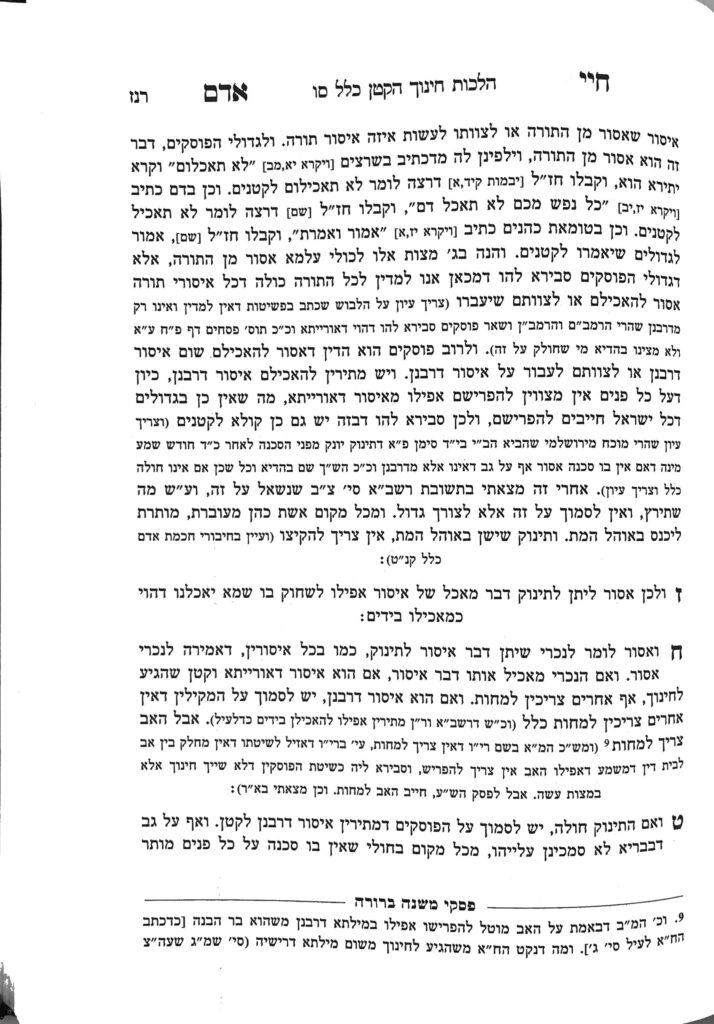We are continuing in siman 6, regarding sefiya b’yadayim on Shabbos. We learned yesterday that, arguably, sefiya b’yadayim should not apply to Shabbos, because, mideoraysa, a melachah needs to be a meleches machsheves. Since a katan does not have daas, by definition they are unable to perform a meleches machsheves, so an action they do cannot have the status of melachah mideoraysa. Thus, for example, if one brings a young child to a light switch for the purpose of the child toggling the light, one can argue that there is no meleches machsheves involved, because the child does not understand the connection between playing with the light switch and the light going on and off. (There would also be no problem of doing a melachah to benefit the adult, because the child is not aware of the adult’s intent.) So, arguably, one is not coaxing the child to do an issur, and it is not sefiya.
However, we learned yesterday that the Imrei Binah understands that the purpose of the pasuk brought in the Mechilta is to teach that notwithstanding the above thought process, there is a unique pasuk regarding Shabbos which forbids such an action.
The Achiezer (3:81) understands differently. He quotes the Terumas Hadeshen who holds that the issur of sefiya b’yadayim is because it trains the child to do actions which are aveiros. Thus, the Achiezer concludes that the issue of sefiya b’yadayim is not the present action, but whether the present action will lead the child to perform this same present action when they are an adult. And, when they will be an adult, the meleches machsheves will be there.
Similarly, the Turei Even writes regarding mitzvos asei that any limitation in the performance of a mitzvah which is due to the age of the child does not relieve the parents from the mitzvah of chinuch. He discusses that the mitzvah of aliyah laregel does not apply to someone who cannot walk on their own feet, yet the chiyuv chinuch on aliyah laregel for a katan is when they are able to walk with their father’s help, i.e., when they are aided. He asks that if the mitzvah of aliyah laregel is for an adult to walk to the Beis Hamikdash unaided, the chiyuv chinuch should not start until the child is able to walk unaided as well.
He explains that a problem inherent in the child’s age is not an impediment to chinuch, because since it will automatically pass as an adult, it does not impact chinuch. Only something which will remain with the child as an adult will be considered an impediment to chinuch. Similarly, in a negative sense, the Achiezer understands that the impact of an action of sefiya b’yadayim which will remain with the child as an adult (e.g., toggling the light switch) is assur to facilitate even on a katan.
Practically, both according to the Imrei Binah and the Achiezer, it is assur to perform sefiya b’yadayim on a child, even if they are too young to have awareness to the action they are performing (and even though the Imrei Binah and Achiezer assur for different reasons).
Summary
The Chayei Adam understands that sefiya b’yadayim to a katan on anything assur mideoraysa, or to tell a child to do any action which is assur mideoraysa, is an issur deoraysa.
Sefiya b’yadayim on anything assur miderabanan is assur as well, but there is an opinion one may rely on (the Rashba) under compelling circumstances to perform sefiya b’yadayim. Either way, it may only be relied upon for the child’s benefit, not for a child to benefit an adult.
One may not coax a child (or facilitate a child) to do a melacha on shabbos even from a very young age, albeit that the child has no awareness of his action.



